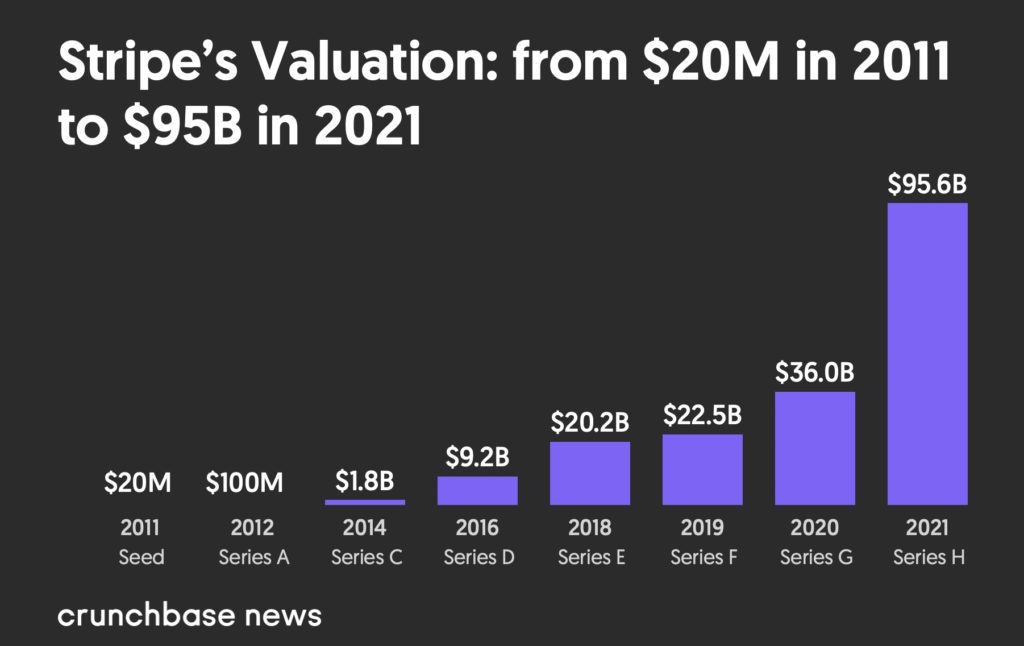Editor’s note: This article was originally published on April 20, 2021. Since then, SpaceX has surpassed Stripe as the most highly valued private company in the U.S.
Payments processing startup Stripe earlier this year became the most highly valued venture-backed private company in the U.S. and the third most valuable in the world when it was valued at $95 billion in its Series H funding round.
Its No. 3 placement on the Crunchbase Unicorn board is just behind Chinese financial services giant Ant Group, valued at $150 billion, and ByteDance, the world’s most highly valued unicorn with a reported valuation of $180 billion in a financing round in late 2020 led by Sequoia Capital and KKR.
Search less. Close more.
Grow your revenue with all-in-one prospecting solutions powered by the leader in private-company data.
Given Stripe’s status as the U.S.’ most highly valued venture-backed private company, and its pivotal role in e-commerce, we decided to take a peek under its hood and use Crunchbase data to understand the business a bit better. That includes taking a closer look at the competitive landscape Stripe faces, its status as the most active private company investor, and its prospects for a public-market debut in the near future.
Stripe, founded by brothers Patrick and John Collison in 2010, has raised 10 equity funding rounds—pacing at almost one funding per year—from its pre-seed Y-Combinator round in 2010 to its most recent, a $600 million Series H round that valued the company at $95 billion. In total, Stripe has raised $2.2 billion from 39 investors.
The Collison brothers grew up in a small town in Ireland and moved to the U.S. to study. As a result, the company has a strong footprint in Europe and the U.S. and is co-headquartered in San Francisco and Dublin.
This is the brothers’ second startup. They previously co-founded Auctomatic and sold it for $5 million in 2008 to Live Current Media.

Investors in Stripe
Investors that led rounds at the earlier stages in Stripe are Sequoia Capital (Series A), General Catalyst (Series B) and Founders Fund (Series C).
Sequoia Capital, which first invested in Stripe’s seed round, remains the most consistent investor over time. Angel investors listed on rounds include Elon Musk and Peter Thiel, who invested at seed; Series A investors Elad Gil and Max Levchin; and Aaron Levie and Chris Dixon investing at Series B. (All 40 investors in Stripe are listed here, including investors in a secondary financing.)
It’s worth noting too that those six angel investors in Stripe have made 125 investments overall in the last five years, according to Crunchbase data, which include 39 investments in financial services, and with 16 of these funding rounds in unicorn companies.
Stripe’s business
Stripe processes hundreds of billions of dollars per year in transactions. It charges 2.9 percent of total transaction value and 30 cents for each payment transaction.
In other words, for each $100 billion in transaction value, Stripe earns $2.9 billion—before adding in the per-transaction fee. The company generated $7.4 billion in revenue last year—up 70 percent year-over-year, the Wall Street Journal reported last week, citing sources familiar with the matter.
Stripe has expanded beyond payment processing software and e-commerce APIs for developers. It now also has an in-store point-of-sales device called Terminal and has built out subscription-based payments and invoicing. It also provides its customers with lending and card issuing services as well as fraud and risk management and custom reporting.
Stripe’s customers include large tech companies such as Instacart, Shopify, Google, Slack, Zoom, Lyft, Amazon and Salesforce.
Investments and acquisitions
Stripe has made nine known acquisitions, per Crunchbase data, ranging from technology around in-store payments to chat, marketing and identity management. Its most recent acquisition was of Nigeria-based Paystack, which it acquired last fall for $200 million to expand into Africa for payments. Stripe also acquired in-store payment company Index in 2018 to compete for market share in physical stores.
We expect Stripe to continue to be acquisitive, given the geographies it supports, its focus on broadening services to its customers and the stiff competition seen in the payment arena.
Interestingly, Stripe has become the most active private company investor since its investment in Monzo in 2017. It is now an investor in at least 33 companies, per Crunchbase, and has led 15 of those funding rounds.
It has invested in nine companies this year alone, contrasting with eight investments for the whole of 2020.
The payments ecosystem is complex with legacy systems and new platforms in different regions needing to transact. It is no surprise that Stripe is investing in fintech even in some cases in an arena where it competes and partners. It has invested most heavily in the payments sector in Rapyd (UK), PayMongo (Philippines), Paystack (Nigeria, which it acquired), Balance (Israel) and Safepay (Pakistan).
Stripe has also invested in neobanks Monzo (UK), Step (U.S.) and Cuenca (Mexico), as well as services focused on tax like Pilot, payroll such as Check and cap table management like Pulley. Platforms focused on customer engagement that it invested in are Assembled, Accord and Pico.
The largest rounds Stripe participated in include two UK-based companies—payments platform Rapyd and Monzo—and the rounds it co-led in San Francisco-based checkout company Fast and New York-based corporate credit card issuer Ramp.
Leading payment companies
Stripe competes in the payments space with other companies that have seen their valuations and revenue climb during the COVID-19 pandemic.
Two Bay Area-based companies—Paypal at $320 billion and Square, built for merchants, at $120 billion—lead in market capitalization among public companies in the payments space.
Amsterdam-based payment processor Adyen is currently valued around $73 billion. All three of the public companies have seen their stock price and revenue climb significantly in 2020.
Of these competitors, Square is focused on in-store merchant payments and PayPal, an online payment solution, allows individuals and businesses to set up accounts and transfer funds electronically. Adyen is a payment processor that sets up a merchant account, unlike Stripe which processes transactions on behalf of a business.
Stripe’s focus, from its beginning, was focused on building developer-friendly code to add to a website to process payments.
Unicorns
Another notable private company payments provider is Sweden-based buy-now-pay-later platform Klarna. The company was last valued this March 2021 at $31 billion, with a $1 billion funding raise. Klarna has raised $3.1 billion over time and thought to be opting for a direct listing as reported by Reuters earlier this year.
In North America and Europe, fintech decacorns also include commission-free trading app Robinhood, checkout experience platform Checkout and neobank Chime of the 17 unicorns valued above $10 billion.
Financial service companies comprise a total of 141 unicorns, 18 percent of the 791 current private unicorns.
European fintech companies that share investors with Stripe include mobile banking Revolut, N26 and Starling Bank. U.S. fintechs that share investors include digital lending platform Blend, pocketmoney app Greenlight and corporate travel management company TripActions.
Market opportunity
Stripe has not indicated that it plans to go public anytime soon. Still, we know from speaking with Roelof Botha, the lead for Sequoia Capital’s U.S. business, who has been involved in quite a few portfolio company public offerings, that the investment firm’s companies tend to prepare at least a year in advance of going public.
Stripe’s hiring in October 2020 of CFO Dhivya Suryadevara, previously the CFO at GM, is another indicator that the company could be getting ready for a public-market debut. Since the third quarter of 2020 Stripe has also beefed up its management team and hired Chief Revenue Officer Mike Clayville, Chief People Officer Carmel Galvin, and Chief Risk Officer Sarah Browne.
Stripe has also appointed two new board directors in 2021: Mark Carney, the previous governor of the Bank of England, and Christa Davies of Aon plc. They joined existing board members Sir Michael Moritz, Diane Greene and Jonathan Chadwick as well as the Collison brothers on Stripe’s board.
Suryadevara summed up how Stripe sees the opportunity ahead in the company’s most recent funding announcement, noting that 14 percent of commerce today is conducted online: “While Stripe already processes hundreds of billions of dollars per year for millions of businesses worldwide, the opportunity ahead is much larger for Stripe than it was when the company was started 10 years ago.”
We tend to agree.
Crunchbase Pro queries listed for this article
All Crunchbase Pro Queries are dynamic with results updating over time. They can be adapted with any company or investor name for analysis.
Stripe funding, investors and board
- Stripe funding rounds total $2.2B
- Investors in Stripe
- Lead investors in Stripe
- Angel investors in Stripe
- Other investments for Stripe angels
- Stripe’s board
Stripe investments and acquisitions
Other fintech companies
- European fintech that share investors with Stripe
- US fintech that share investors with Stripe
- North American and European payments companies with last funding at Series A
Unicorns
- North American and European unicorns valued above $10 billion
- Unicorns in Financial Services (132)
- Venture-backed private companies that have raised more than $2B
Illustration: Dom Guzman

Stay up to date with recent funding rounds, acquisitions, and more with the Crunchbase Daily.




![Illustration of a suitcase stuffed with money. Megafunds [Dom Guzman]](https://news.crunchbase.com/wp-content/uploads/Megafunds-470x352.jpg)
![Illustration of a man sitting on a huge pile o' money. [Dom Guzman]](https://news.crunchbase.com/wp-content/uploads/Giant_Funding-470x352.jpg)
![Illustration of agentive AI brain - Europe - Quarterly. [Dom Guzman]](https://news.crunchbase.com/wp-content/uploads/Agentive_AI_europe-470x352.jpg)
![Illustration of a guy watering plants with a blocked hose - Global [Dom Guzman]](https://news.crunchbase.com/wp-content/uploads/quarterly-global-3-300x168.jpg)
67.1K Followers